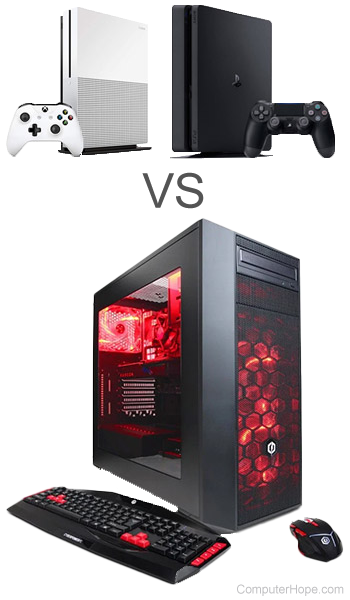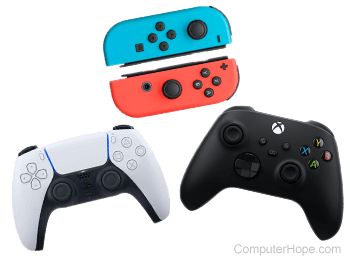Console vs. PC gaming

Gamers have debated whether gaming on a console (e.g., PlayStation or Xbox) or computer is better since the mid-1990s. There were even times when "experts" proclaimed that PC gaming was dead. Today, both platforms are popular. PC gaming has recently seen a significant boost in exposure thanks to streamers on platforms like Twitch.
This page lists the pros and cons of gaming on a console and a PC to help those trying to decide between the two. Generally, most people choose a console for its ease, price, and access to exclusive games. Others choose the PC for better online support and higher (albeit more expensive) graphics quality, and more input control and screen options.
Ease
Console - The console is designed specifically for gaming and can be easier to use than a PC. A gaming console only does one thing, so the directions are more streamlined. In addition to being easy, consoles are designed for TVs, and playing on a couch is more relaxing than an office chair.
Although not as easy as a console, you can connect your computer to your TV, use a wireless gamepad, and play PC games from your couch.
If you're playing a game that requires you to read text (e.g., subtitles or dialogue options), it may be difficult to read that text when sitting further away.
PC - Playing games on a computer has become easier. However, a computer still requires an operating system and all its hardware (e.g., video cards) to be updated and maintained in addition to game updates. Also, because a PC can do more than only gaming, it must be protected from viruses and other malware.
Bottom line: Console wins this category.
Membership
Console - With a console, a membership fee must be paid to compete against other players online. On Nintendo devices, this fee is $20 per year, and on the Xbox and PlayStation, it is $60 per year.
PC - Although some PC games require a subscription or fee, most are free to play online.
To play online, both platforms require a broadband connection, an additional monthly fee.
Bottom line: PC wins this category. Most games on the PC require no additional membership fee to play against other players online.
A lot of newer online games for both platforms may have season passes. Although these are not required, if purchased, it's an additional cost.
Cost
Console - A gaming console can cost between $400 and $700, depending on the manufacturer, version, and how many accessories you purchase. While this may seem expensive, it's cheaper than building a gaming PC with equivalent hardware when the console launches. In addition to being cheaper, it can connect to your TV, so you don't necessarily need a new display.
PC - A decent gaming computer usually costs more than a console. You can expect to pay at least $800 or more for a gaming laptop.
Bottom line: Console wins this category. While the price for a game is roughly the same for both platforms, a console, even with an extra gamepad, is usually still less expensive.
Game availability
Console - Consoles have a vast library of available games. In addition, each console has exclusive games.
PC - Computers have the largest collection of available games, beating out any console. PCs are also the best platform for MMOs and smaller indie games that don't have the resources to release their game to all platforms. Also, PCs can have emulators installed that allow them to run older games from consoles.
Bottom line: There is no clear winner for this category. All platforms have numerous games, and your decision could depend on the game you want. For example, you may decide on the PS4 because it's the only platform with the new Spider-Man game.
Upgradability
Console - New consoles are released once every several years to update their hardware and capabilities. However, you have to buy a new console to get these upgrades. Although a console may be better than many PCs when it's released, after a few years, it can become outdated.
PC - All the hardware in a computer can be upgraded. If you run out of hard drive space to store your games, you can install a bigger hard drive. If you want faster performance or new graphics capabilities, you can upgrade the video card without needing a new computer.
Bottom line: PC wins this category.
Portability
Console - A console is a single box with two cables (power cable and HDMI (High-Definition Multimedia Interface)) and a wireless gamepad. With so few parts, it's easier to disconnect and move your console between locations.
PC - If you're using a desktop PC, it can have four or more cables connected to it. Also, the PC needs the keyboard and mouse for input. Having extra devices and cables makes it more difficult to disconnect and move your PC, especially if it's in a hard-to-reach location (e.g., below a desk).
Bottom line: Console wins this category. If you plan on changing your device's location, it's easier to move a console.
Controls

Console - Each console comes with one gamepad. For new gamers, it's often easier to pick up and use a gamepad than a keyboard and mouse. However, for players to compete against others who use a keyboard and mouse (especially in first-person shooters), the gamepad could be a disadvantage. A keyboard and mouse can connect to a console, but not all games support them.
PC - When playing a game on a PC, you're most likely using a keyboard and mouse, but you can also use a gamepad. Also, a PC can support any input device, regardless of the game. For consoles, other input devices, like a steering wheel, may be available, but only if it's designed into the game by the developer.
Bottom line: This category has no clear winner, as it depends on the player. Many players prefer the gamepad because it's portable and easy to use. The keyboard and mouse, however, offer more customization of the game's controls, and are usually more accurate for aiming on games without aim assist.
Online community
Console - Most console games are platform-dependent, meaning if you have an Xbox and your friend has a PlayStation or PC, you cannot play together even though you both have the same game. Some newer games are cross-platform, but many do not have this option.
PC - Like the console, most PC games are only playable against other PC gamers. Microsoft has made some progress at getting Xbox games to be more compatible with PCs. However, it's up to the game developer to make a game cross-platform.
Bottom line: There is no clear winner for this category. Your decision may depend on where your friends play.
Graphics quality
Console - When consoles are released, they meet or exceed the graphics quality found with the same game for the PC. However, as time progresses and with the inability to upgrade, consoles lag in graphics quality and technology. Gaming PCs can always achieve the absolute best quality with newer games.
PC - Unlike a console, it's possible to upgrade the video card and get all the latest graphics technologies. New consoles may keep up with gaming PCs initially; however, when new games are released for both platforms, they often look better on the PC after a while. Some older games may be upgraded or have mods to use newer technologies unavailable on the console.
Bottom line: When comparing the same game, a high-end PC always wins this category.
Mods
Console - There are a few console games with limited mod support. However, most console games don't support mods.
PC - If a game has a strong following, the mod community can add many more options. For example, mods can be installed to add better or different visuals, change how the game operates, improve the game's UI (user interface), and more.
Bottom line: PC wins this category. A popular PC game can have thousands of available mods.
Some games have mod support on consoles. However, it's up to the game developer when it's available, it's up to the enthusiast (usually one fan) to make it work on all platforms. For example, the popular game Skyrim has thousands of mods available for the PC. However, many of those mods are unavailable for consoles or limited to one brand (e.g., only the Xbox).
Cheating
Console - Because consoles are designed for games, third-party software is not easy to install or use, making cheating in online console games more difficult.
PC - On the PC, software can be designed to cheat in online games. Although it may be against a game's TOS (terms of service), you are more likely to encounter people cheating on a PC than a console.
Bottom line: Consoles win this category because it's more difficult to cheat on them.

DRM and piracy
Console - Because the console is more of a closed system than a PC, it's more difficult for people to pirate games. This design is good for gaming companies and consumers because extra DRM (digital rights management) protection doesn't need to be running to help prevent piracy.
PC - Because anyone can write software to allow people to pirate programs, it's up to the game developers to create mechanisms to protect against piracy. Unfortunately, one of the best methods is with DRM techniques. However, this extra software can cause problems for the people who have legitimately purchased the game.
Bottom line: Console wins this category because DRM is not as intrusive as it is on the PC.
Hardware requirements
Console - When buying a game for a console, you only need to know what console you have. For example, are you using a PlayStation 3, PlayStation 4, Xbox 360, or Xbox One? As long as you buy the game for the correct console, you don't have to worry about the game not working.
PC - When buying a game for a PC, verify the computer meets the system requirements. With a newer gaming computer, this isn't a factor. However, for computers that are a few years old, ensure your computer has the necessary hardware requirements. Otherwise, the game won't work or may perform poorly.
Bottom line: Console wins this category.
Legacy and backward compatibility

Console - When a new console is released, it may not run older games because of how they're programmed. Some popular titles may be redesigned to allow them to work on the new console, but require you to purchase the redesigned version.
PC - Unlike a console, Microsoft tries to keep Windows as backward compatible as possible. However, some advancements cause older software to no longer work. With PC, software emulators, patches, and community mods allow most older games to work with newer computers.
Bottom line: PC wins this category. Although it can take some work, most older games can be played on new computers, but consoles are usually generation-specific.
